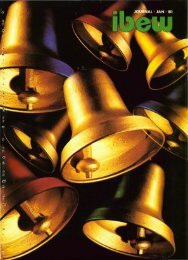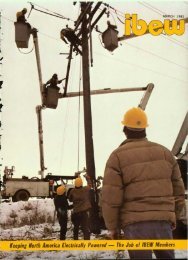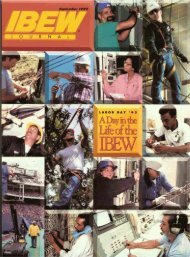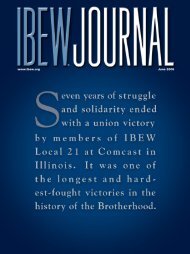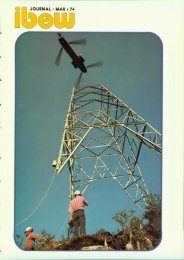t - International Brotherhood Of Electrical Workers
t - International Brotherhood Of Electrical Workers
t - International Brotherhood Of Electrical Workers
You also want an ePaper? Increase the reach of your titles
YUMPU automatically turns print PDFs into web optimized ePapers that Google loves.
I6<br />
No. 1 American labor continues to be agitated<br />
Problem by the vexed problem of unemploymient.<br />
Important light is thrown upon this dire<br />
and stubborn phenomenon by the Monthly Survey of<br />
Business of the American Federation of Labor.<br />
"In October, 1929, the Federal Reserve Board adjusted<br />
index of industrial production stood at 118, and<br />
there were 47,000,000 persons at work in the United<br />
States, with only 1,000,000 unemployed; 10 years<br />
later, in October, 1939, the production index stood<br />
at 120, and there were 44,000,000 at work and 9,000,000<br />
unemployed. In these 10 years, machinery and labor<br />
saving devices had replaced 3,000,000 workers. While<br />
these 3,000,000 jobs were eliminated, 5,000,000 new<br />
workers were added to our working population, making<br />
a total 8,000,000 for whom jobs are needed.<br />
These 8,000,000 new job seekers, added to the<br />
1,000,000 unemployed in October, 1929, make up our<br />
present army of 9,000,000 unemployed.<br />
"The 3,000,000 who are now jobless because of<br />
labor saving devices represent only a part of the<br />
'technological' unemployment dclue to the progress of<br />
the machine. Between 2,000,000 and 3,000,000 more<br />
would have been unemployed today, according to our<br />
estimates, had it not been that their jobs were saved by<br />
shortening the workweek. It is a striking fact that by<br />
taking 10 hours from the workweek, reducing it from<br />
average 50 hours in 1929 to average 40 hours in 1939,<br />
we have prevented technological unemployment from<br />
reaching 6,000,000 and have held it to 3,000,000. This<br />
is an oulstanding achievement equalled in no other<br />
country of the world. It has been accomplished very<br />
largely by voluntary action, first through the President's<br />
Reemployment Agreement in 1933, followed<br />
by NRA codes, then through strong trade union action<br />
by collective bargaining. All these were forms of voluntary<br />
agreements, involving employers, workers and<br />
in the first two cases the government also. Standards<br />
set by these agreements have now been established<br />
by legislation. The Fair Labor Standards Act fixes<br />
42 hours as the legal maximum workweek for all<br />
companies in interstate commerce, recognizing this<br />
standard as accepted practice in our country. This is<br />
The Journal of ELECTRICAL WORKERS and Operalors<br />
an iodstanding example of social adjustment in a<br />
JOURnAL OF<br />
dleneracy. Voluntary agreements, later established<br />
through legislation, have changed one quarter of our<br />
ELECTRICAL WUJORHERS unemployment into leisure and saved nearly 3,000,000<br />
OFFICIAL PuI AgrTiOn IflTERHUTWOIAL BROllhUfAODD Or ELECTRICAL WORWER5jobs.<br />
Voulu,,v 2XXJX Washnnluln, D. C., Frbrlry, 1I(O No, 2<br />
"Hope for the remainling 9.000,000 unemployed lies<br />
in increasing industrial production and gradual further<br />
shortening of work hours. We estimate that industrial<br />
production will have to reach a level at least<br />
25 per cent above that of 1929 ill order to give jobs to<br />
all the unemployed. Such an inlrease in production<br />
would mean a higher general living standard for our<br />
population."<br />
Saving the The general staff planning the cam-<br />
United Front paign of the withering United Front<br />
(the C. I. 0., the communists, the liberals<br />
and cerltain government agencies) foresaw<br />
months ago that the communist penetration oC the<br />
C. I. O. would wreck its standing with the American<br />
people. Hurriedly plans were made to offset this disaster.<br />
The general staff foresaw that it would be<br />
impossible to wipe the stain of communism off the<br />
C. I. 0. escutcheon. Shrewdly, therefore, the general<br />
staff declared, we must tar the A. F. of L.<br />
This process has been going on in a forthright<br />
manner. Every effort that could be put forth has been<br />
used to create the belief in the public mind that the<br />
unions of the A. F. of L. are racketeering unions. The<br />
general staff said, following its policy of rule or ruin,<br />
that if the C. I. 0. was to be tagged as communist, the<br />
A. F. of L. shall be tagged as racketeer.<br />
Whether or not Mr. Thurman Arnold, of the U. S.<br />
Department of Justice, was a conscious tool of this<br />
campaign, by his attack upon the building trades<br />
unions by means of the illegal use of the Sherman<br />
Act, he played directly into the hands of the general<br />
staff. Let us look at the record.<br />
The American Federation of Labor has 4,000,000<br />
members. At the minimum this means 12,000,000 citizens<br />
if we rate a family of three as the present unit<br />
of American life. No one is going to believe that these<br />
sincere, respectable, hardworking unionists are racketeers.<br />
Neither is anyone going to make any thinking<br />
citizen believe that the 150,000 local union officers<br />
manning the 36,000 local unions in the American<br />
Federation of Labor are racketeers. This is too raw<br />
a piece of propaganda even for unsuspecting Americans<br />
to swallow.<br />
Mr. Arnold has brought indictments against many<br />
trade unionists. In New Orleans he has quite frankly<br />
said in effect that A. F. of L. unionists are guilty of<br />
restraint of trade because they do not allow C. I. O.<br />
unionists to deliver goods on the job. Mr. Arnold has<br />
moved against the president of the A. F. of L. Seafarers<br />
union but has refused to move against the presi-




